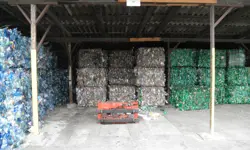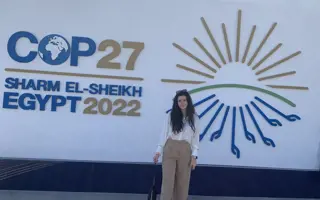
How I started my entrepreneurial journey while still at school
I have always been curious about the world and its workings. Geography was the catalyst for me to connect with engineering at school, learning about the environment and how it interacts with and causes societal changes. My interest in STEM was also sparked by a desire to impact people’s lives, particularly when it comes to ensuring a healthy start to our day.
Protecting health from air pollution is a growing concern. Air pollution has various health effects globally, accounting for over nine million deaths each year. However, after feeling the impact of air pollution on my health and the environment while walking through lingering pollution the day after Bonfire Night in 2018, I realised I needed to understand this problem better. I became determined to find a creative solution and take action.
I began working on a pin badge to monitor air quality, creating an initial prototype after school hours. I was lucky to have guidance from my textiles teacher and access to space in the school’s technology department. This support was crucial because I lacked the resources to create an upcycled material casing at home for the off-the-shelf sensor and mobile phone barrel charger I used in the first project, which resulted in a wearable but bulky design.
As the idea developed, I began collecting data as I moved around, sketching ideas and researching existing air quality monitors. Through this, I discovered the Innovation Awards at the Business of Science Conference. In 2019, I presented the prototype of the pin badge at the conference. This was a launchpad for the company's dramatic evolution. It also gave me access to specialist help that wasn't available in school or at home.
Today’s Perfect Sense AQ pin badge uses nanotechnology and graphene’s exceptional properties to miniaturise a highly sensitive gas sensor into a wearable badge. It delivers customised insights through a mobile app, so that users can take action to protect their health. It also makes air quality monitoring accessible to all and provides hyperlocal data through added Global Navigation Satellite System (GNSS) positioning systems. I hope it will help us achieve the UN’s Sustainable Development Goals and more equitable outcomes for everyone.
Breaking down age barriers
Perfect Sense AQ has come a long way since winning the individual prize in the UK government's Youth Industrial Strategy competition and the UK Space Agency's SatelLife competition in 2020. These experiences inspired me to turn my pollution-sensing pin badge into a full-fledged startup.
Today’s Perfect Sense AQ pin badge uses nanotechnology and graphene’s exceptional properties to miniaturise a highly sensitive gas sensor into a wearable badge
Despite my age, some people acknowledged my determination and vision for making a positive impact through technology and could support my ideas. Others were initially surprised when I became CEO at 14 and did not understand the obstacles I had to overcome to get help and expand my skills, particularly the technology side. I've surrounded myself with supportive individuals who share my passion for making a difference. Together, we developed a customised skills and entrepreneurship development programme that has been vital for my personal growth and the success of Perfect Sense AQ.
Early on, I found a supportive ally in James Baker from Graphene@Manchester, who provided valuable guidance and embraced my ideas from our first conversation. His advocacy and encouragement, with specialist support from the Graphene Engineering Innovation Centre (GEIC) team, have helped me progress. I am excited and grateful for their ongoing involvement. James and the team also signpost me to networks and introduce me to others who can help my personal and product development. This includes the Bridging the Gap accelerator programme, which has helped me incorporate graphene into my product design. Through the programme I had support from application managers, who wrote a literature review on graphene gas sensors that became the foundation for my innovation roadmap. The study also helped me identify more focused areas for development, such as the types of graphene sensors, power, cases, and how to join up all the tech parts with data. And linking to the Graphene Flagship community has connected me with more likeminded people who have supported and helped my journey.
Through another mentoring programme with Dell Technologies, I received personalised guidance that improved my technical skills and encouraged me to innovate. This collaboration continues and fosters a culture of systems thinking in my work, which I struggled to access before.
I also took part in the Galileo Masters incubator programme, which provided me with invaluable support, resources, and guidance. It also gave me a unique solution to my network problems. By integrating GNSS within the Perfect Sense AQ pin badge, I can now gather hyperlocal data with an impressive accuracy of up to 20 centimetres, significantly improved compared to the 5 to 10 metres of traditional mobile phone positioning. This accuracy has been key to my product development, allowing me to provide people with real-time air quality data for their exact location. It has been a game-changer for the pin badge.
In both accelerator programmes, I have collaborated with people who believe in my idea and vision. As a young entrepreneur, I have faced several barriers to accessing online boot camps, for example, because of minimum age requirements. However, the support of application managers, mentors and other entrepreneurs has helped me navigate these challenges and build a development programme that works for me.

The Perfect Sense AQ pin badge
Managing a startup with study
My typical term-time day is busy, studying for A levels in geography, sociology and maths. However, late afternoons are more flexible when I can dedicate time to Perfect Sense AQ, manage the team, attend online meetings, access mentoring, which is essential to everything, and work on the development roadmap. Sometimes, when time differences or diary commitments from others don't work, when time zones get in the way for example, I take part in the occasional online meeting at school so I’m grateful to have an understanding head of year. But, generally, my team members and contacts are flexible to meet and plan after study hours, with face-to-face meetings booked into my schedule weeks in advance!
I've been working this way for five years and managing my studies, work diary, badge development, and deadlines well. Shared calendars and time management are vital to balance my life. I delegate some responsibilities to my parents or teams around me and diarise work packages around key assessment dates. Last year while doing my GCSEs, sensor and GNSS chip work continued with remote check-ins, and our rebranding strategy started as soon as the school invigilator collected my final paper!
Advice for budding entrepreneurs
I advise others to always surround themselves with people who believe in them and their solutions. Secondly, getting involved in local networks is a fantastic opportunity to meet others in the same field as you, hear their stories, and be inspired. For me, being welcomed into the Graphene Flagship, Galileo Masters and Space Hub Yorkshire networks has made a big difference to me and my plans for Perfect Sense AQ.
Having mentors from diverse backgrounds has also been an essential part of my entrepreneurial journey. It has inspired me personally and helped support my systems thinking and innovation across the team, particularly with a bespoke mentoring programme to develop personal and technical skills with the Geospatial Ventures team. Working with people from different perspectives also makes me more likely to challenge my initial thoughts, break out of my biases, and consider new and creative solutions.
Having mentors from diverse backgrounds has been an essential part of my entrepreneurial journey. It has inspired me personally and helped support my systems thinking and innovation across the team
Working on Perfect Sense AQ opened my eyes to the potential of engineering to drive global change
In 2021, the Department for Transport invited me to contribute to COP26 in Glasgow, which was a great honour and opportunity. This panel discussion was an incredible way to share my experiences and insights about transport for the future and the potential of portable sensors to address air pollution, while learning from leaders in the field. Being part of the panel broadened my understanding of the interconnected nature of climate change, transport and air quality and how engineering and technology can work alongside other disciplines to visualise and create real-world solutions. Attending COP26 was about more than just discussing our problems; it was also about exploring and sharing solutions to help us create a more sustainable future. It was a chance to learn from others, share ideas, and collaborate on interdisciplinary approaches to tackle climate change.

Ava (centre) on the panel on transport day at COP26 in Glasgow, November 2021
Quick-fire facts
Age: 16
Qualifications: GCSEs and studying for A Levels in maths, geography and sociology.
Biggest engineering inspirations: Andre Geim and Konstantin Novoselov at the University of Manchester discovering graphene in 2004 during one of their Friday night experiments, using sticky tape to extract graphene from graphite.
Most-used technology: Mobile phone
Three words that describe you: curious, determined, optimistic
Through my own experiences, I have realised the power of engineering as the impetus for individuals to build their future. By giving people the tools to measure and track air pollution, we can all play a part in reducing its impact on our health and the environment.
My journey into engineering began with a simple walk to school, and it has led me on a path of innovation and discovery. I am grateful for the opportunities that have come my way and the chance to impact the world positively. By working together, we can solve some of the most pressing challenges we face today, and I am excited to see what the future holds.
Contributors
Ava Garside
CEO, Perfect Sense AQ
Keep up-to-date with Ingenia for free
SubscribeRelated content
Environment & sustainability

The extreme engineering behind life on an Antarctic station
Antarctica is one of the most challenging environments on the planet, but of enormous scientific importance to humanity. Technology and engineering is essential to enable the British Antarctic Survey's researchers to pursue their science effectively in this awe-inspiring landscape.

Recycling household waste
The percentage of waste recycled in the UK has risen rapidly over the past 20 years, thanks to breakthroughs in the way waste is processed. Find out about what happens to household waste and recent technological developments in the UK.

Upgrade existing buildings to reduce emissions
Much of the UK’s existing buildings predate modern energy standards. Patrick Bellew of Atelier Ten, a company that pioneered environmental innovations, suggests that a National Infrastructure Project is needed to tackle waste and inefficiency.

An appetite for oil
The Gobbler boat’s compact and lightweight dimensions coupled with complex oil-skimming technology provide a safer and more effective way of containing and cleaning up oil spills, both in harbour and at sea.
Other content from Ingenia
Quick read

- Environment & sustainability
- Opinion
A young engineer’s perspective on the good, the bad and the ugly of COP27

- Environment & sustainability
- Issue 95
How do we pay for net zero technologies?
Quick read

- Transport
- Mechanical
- How I got here
Electrifying trains and STEMAZING outreach

- Civil & structural
- Environment & sustainability
- Issue 95